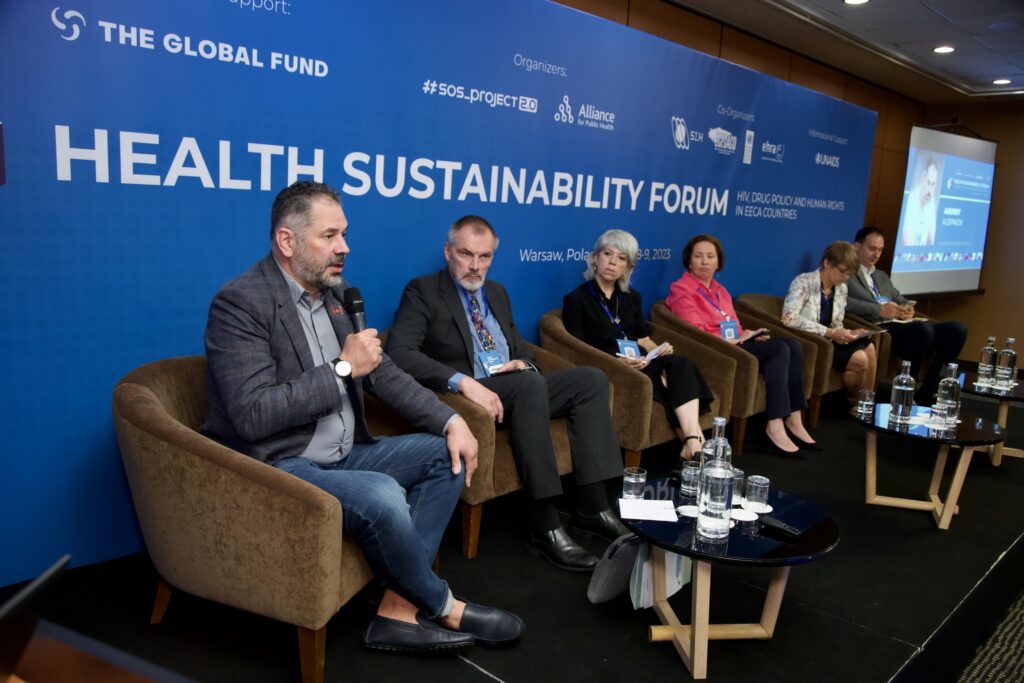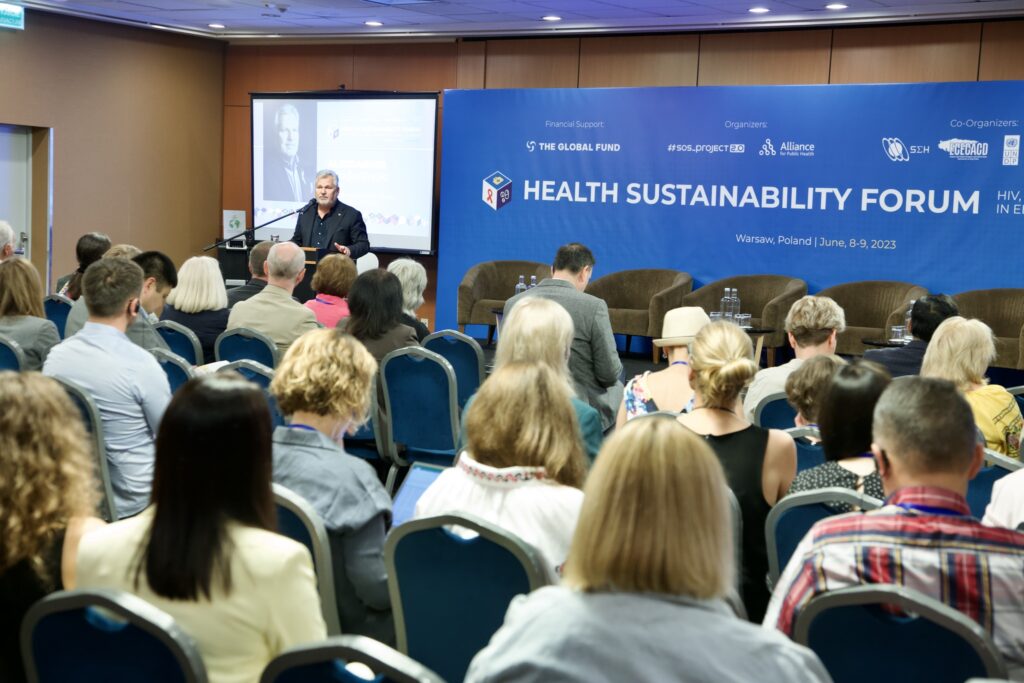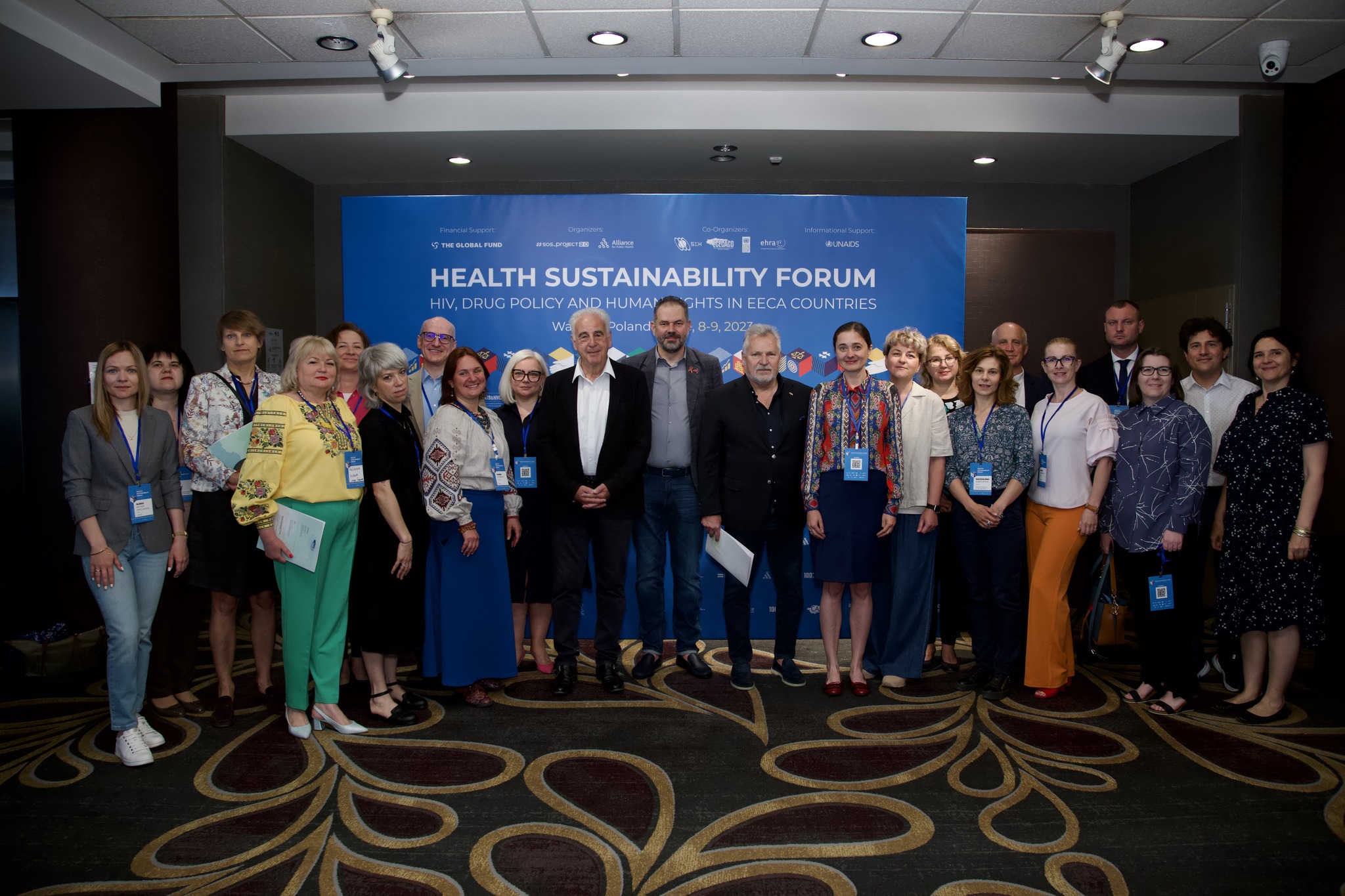On June 8-9, Warsaw hosted the regional Health Sustainability Forum – 2023 with more than 100 participants from 25 countries.
The event brought together national, regional and international partners of the SoS 2.0 project to mobilize knowledge and expertise for dialogue on priority issues in the changing context of new political, social and economic challenges.
The key point to discus is how to ensure sustainable access of key populations to basic services in the current circumstances. The EECA region is currently undergoing a serious historical process of transformation, marked by Russia’s war against Ukraine, its humanitarian and economic losses in Ukraine, political instability in Moldova and Georgia, as well as negative reactions to the democratic reforms achieved earlier in some countries of Europe and Central Asia. These developments have a significant impact on the political, economic and social spheres and create new challenges and risks.
The leitmotif of the Forum was to discuss how to ensure sustainability of health systems in the context of HIV/AIDS in the current conditions in the region, and the participants were eager to share their perspectives on current challenges.
The Forum was opened by Aleksander Kwasniewski, former President of Poland and Chairman of ECECACD. Mr Kwasniewski delievered opening presentation on “Complex and Changing Environment in the EECA Region. A Global Political Perspective on Geopolitics. Analyzing the impact of the war in Ukraine on the political situation in the EECA region”.
The first day of the Forum addressed such important issues as:
– Health System Strengthening, Emergency Response, Migration Crisis, Service Continuity, Response Flexibility, Emergency Planning.
– Health Service and Business Continuity.
– Integration of HIV into universal health coverage and relevance of universal health coverage goals for the EECA region.
– Readiness of health systems to decentralize HIV testing and treatment services.
– Risks and challenges associated with decentralized procurement, surveillance in the EECA region.
– Comparative cost analysis of current HIV testing and VET-based strategies in the EECA region.
– Decentralized funding: the case of Podgorica.
– Gaps and challenges in providing comprehensive and continuous HIV care in prisons – EECA regional overview.
– Global and regional reality, current context, challenges and opportunities for drug policy reform.
– New vectors of drug policy change in the countries of the region.
They also discussed conditions and funding opportunities for the EECA region.
On the second day the participants’ attention was focused on:
– How to achieve the first 95 in EECA countries: from WHO recommendations to closing gaps in HIV diagnostics. Status-neutral approach to HIV prevention and treatment.
– Key points for optimizing national HIV testing and ART strategies in line with WHO recommendations in EECA countries.
– Health and access to HIV services among MSM.
– Optimization of HIV case detection in Central Asia.
– The power of PrEP: how to simplify PrEP services and consider innovative approaches, including long-acting cabotegravir.
– Long-acting buprenorphine in the treasury of substitution maintenance therapy: plans for implementation in Kyrgyzstan and Ukraine.
– Best practices and experience of evidence-based advocacy to improve the legal environment and human rights in EECA countries. What approaches and tools work in what settings. Quality of services and medicines. Results of research on gender barriers in 15 countries.
– Virtual social worker as a tool to improve service delivery within an integrated digital service delivery system.
– DHIS2 as one of the leading HIS in the world.
– Digitalization of HIV prevention, care and support service delivery processes using the DHIS2 framework.
– Digital public health ecosystem in Ukraine as part of digital transformation. Data architecture and digital tools of Ukraine in the public health system.
– Region-wide data – creating a common space to showcase regional and national level highlights.
Andriy Klepikov, Executive Director of the Public Health Alliance spoke about Ukraine’s successful experience in the current realities: “At the Forum, the most sought-after experience of Ukraine: how we ensure sustainability of health programs in war conditions. Among the factors are mutual support of partners, organizational readiness, mobility, digitalization, innovation and result orientation. It’s stormy in the whole EECA region and what worked in the 9-point storm in Ukraine will work in other countries”.
The Forum provided an opportunity for dialog, exchange of experiences, communication and cooperation between advocates, civil society and communities. Participants discussed and coordinated joint goals to overcome barriers to access and sustainability of the HIV response in the region. The event also aimed to sensitize decision makers from national and regional organizations as well as major donors on the need for a sustainable HIV response and supportive environments in the region.
The Health Sustainability Forum was organized by the SoS_project 2.0 team and the Alliance for Public Health, with support from Social Equation Hub, ECECACD, UNDP Eurasia, Eurasian Harm Reduction Association – EHRA, UNAIDS Eastern Europe and Central Asia, and with financial support from The Global Fund.








